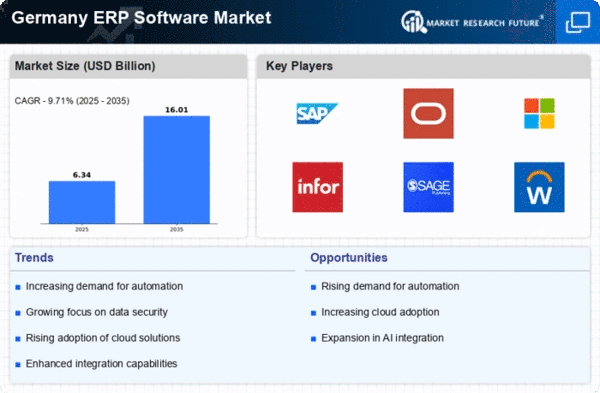Regulatory Compliance
Regulatory compliance remains a significant driver in the ERP software market, particularly in Germany, where businesses face stringent regulations. The need to comply with laws such as the General Data Protection Regulation (GDPR) and various industry-specific standards compels organizations to invest in robust ERP systems. These systems facilitate compliance by automating reporting processes and ensuring data integrity. As of 2025, it is estimated that around 70% of German companies prioritize compliance features in their ERP solutions. This focus on regulatory compliance not only mitigates risks but also enhances operational transparency, making it a crucial factor in the ERP software market.
Focus on Cost Efficiency
Cost efficiency is a critical driver influencing the ERP software market. German companies are under constant pressure to optimize their operational costs while maintaining high-quality service delivery. ERP systems provide tools for automating processes, reducing manual labor, and minimizing errors, which can lead to significant cost savings. As of 2025, it is estimated that businesses utilizing ERP solutions can reduce operational costs by up to 25%. This focus on cost efficiency is driving organizations to invest in ERP software that not only streamlines operations but also enhances profitability, making it a vital consideration in the ERP software market.
Technological Advancements
The rapid pace of technological advancements is a key driver in the ERP software market. Innovations in artificial intelligence (AI), machine learning, and data analytics are transforming how businesses operate. In Germany, companies are increasingly adopting these technologies to enhance operational efficiency and decision-making processes. The integration of AI into ERP systems allows for predictive analytics, which can improve inventory management and customer relationship management. As of 2025, the ERP software market in Germany is projected to grow at a CAGR of approximately 8.5%, driven by these technological advancements. This growth indicates a strong demand for sophisticated ERP solutions that can leverage new technologies to provide competitive advantages.
Increased Demand for Integration
The growing demand for integration capabilities is a notable driver in the ERP software market. Businesses in Germany are increasingly seeking solutions that can seamlessly integrate with existing systems and third-party applications. This trend is driven by the need for real-time data access and improved collaboration across departments. As organizations adopt various software solutions, the ability to integrate these systems becomes essential for maintaining operational efficiency. In 2025, it is projected that over 60% of German enterprises will prioritize integration features when selecting ERP software. This demand for integration highlights the importance of flexibility and adaptability in ERP solutions.
Shift Towards Remote Work Solutions
The shift towards remote work solutions is reshaping the ERP software market landscape. In Germany, organizations are increasingly adopting ERP systems that support remote access and collaboration among distributed teams. This trend is driven by the need for flexibility and the ability to maintain productivity regardless of location. As of 2025, it is anticipated that approximately 55% of German companies will prioritize ERP solutions that offer robust remote work capabilities. This shift not only enhances employee satisfaction but also enables businesses to adapt to changing work environments, making it a significant driver in the ERP software market.

















